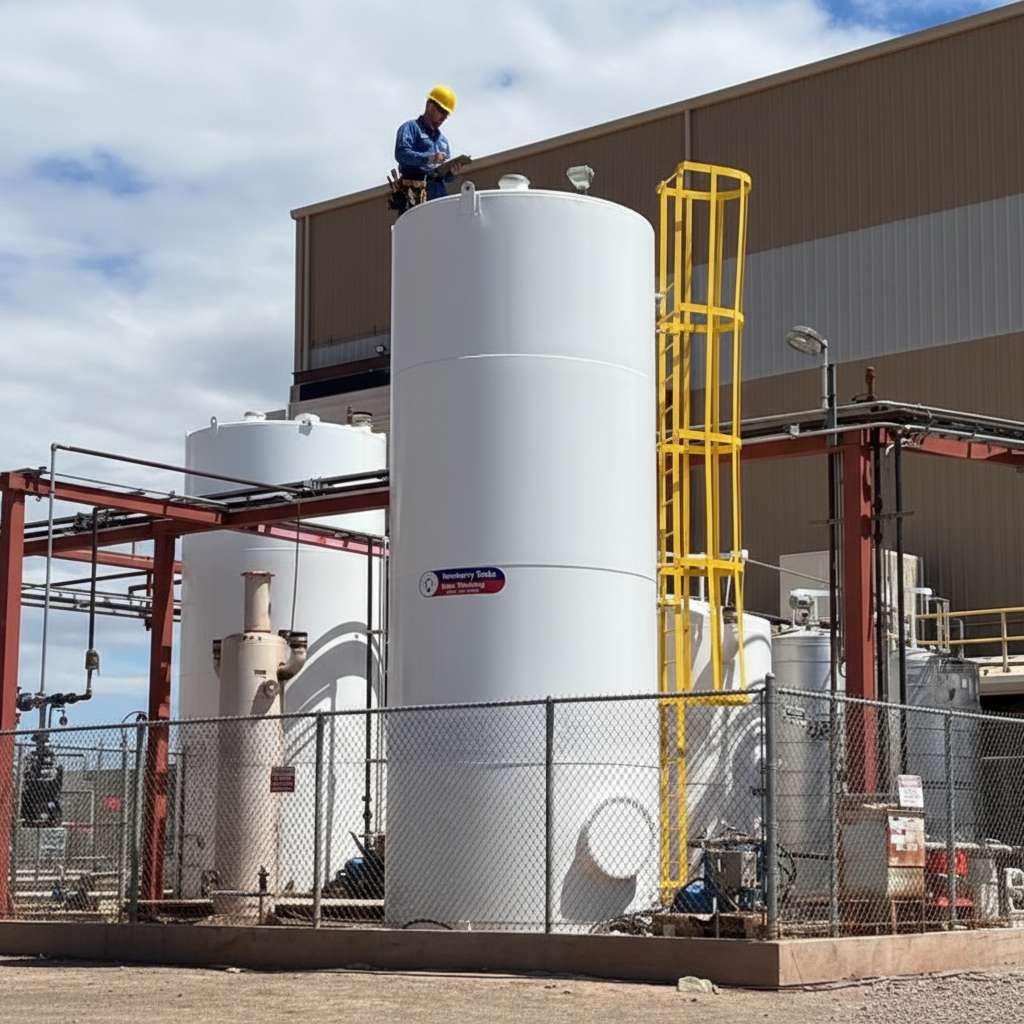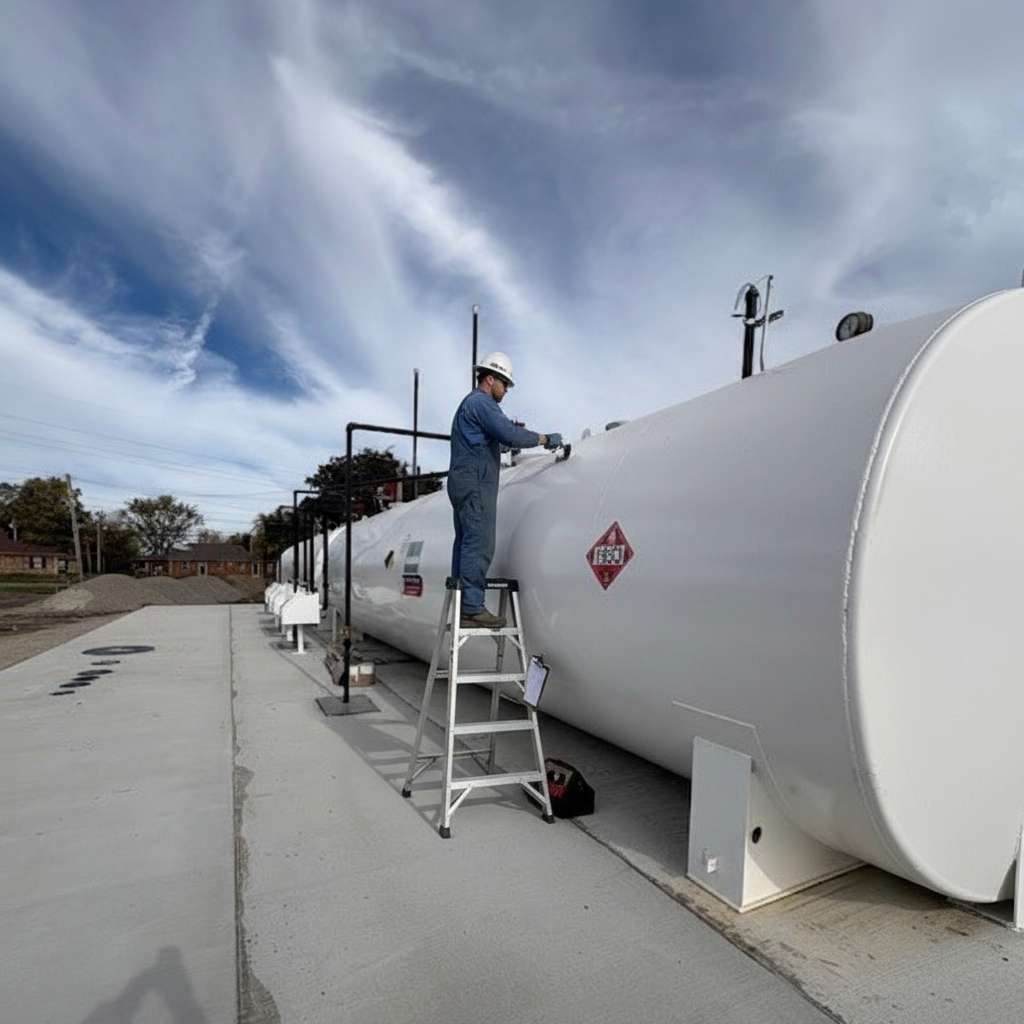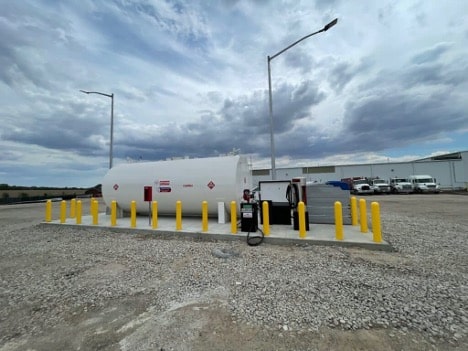At Newberry Tanks, we’ve seen it all—damaged tanks leaking thousands of gallons, fleets sidelined by clogged filters, and generators failing in the middle of a storm. Our nearly 100 years of experience show that one overlooked inspection can cost operators thousands in downtime.
Whether you’re fueling a job site generator, managing a fleet, or keeping industrial equipment running, your fuel tank is the heartbeat of your operation. Treat it right, and it will protect your fuel, your equipment, and your business. Neglect it, and you risk costly failures at the worst possible moment.
How to Inspect Fuel Tanks: A Regular Schedule
Small issues become big problems fast. A pinhole leak today can become tomorrow’s environmental incident or loss of product. That’s why the operators we’ve worked with who stick to a consistent inspection schedule see fewer breakdowns and longer tank life.
- Weekly Walkarounds → Look for leaks, dents, rust spots, or coating failures.
- Fittings & Valves → Check for seepage at valves, flanges, and welded joints.
- Fuel Lines & Hoses → Inspect for cracks, brittleness, or swelling that signal aging.
- Vents & Caps → Make sure vents are clear and caps are tight— water infiltration and debris in atmospheric vents cause hidden damage.

Newberry Tanks Pro Tip
We’ve seen too many operators skip inspections because “the tank looks fine.”
A simple checklist makes the process quick and consistent—and can save thousands in repairs.
Newberry Tanks Pro Tip
We’ve seen too many operators skip inspections because “the tank looks fine.”
A simple checklist makes the process quick and consistent—and can save thousands in repairs.
How to Prevent Fuel Tank Corrosion
Corrosion is the silent killer of fuel tanks. Once it starts, it spreads quickly and often goes unnoticed until the damage is severe. We’ve seen operations lose entire tanks because water sat pooled around the base left to accumulate for too long.
- Exterior Surface → Touch up chipped paint fast; rust always starts small.
- Secondary Containment → Keep berms and basins dry and free of debris.
- Water Management → Rainwater pooling is a red flag—install drainage or re-grade soil if needed.
Newberry Tanks Pro Tip
Take a close look at the outside of your tank. If you notice any thinning spots, bubbling, or lifting on the surface, those could be early signs of hidden corrosion. Don’t brush it off—catching it early could save the tank. If you see anything suspicious, it’s a good time to bring in a qualified inspector for a more thorough check.
Explore Newberry Tanks’ Storage Tanks for durable, long-lasting solutions.
Newberry Tanks Pro Tip
Take a close look at the outside of your tank. If you notice any thinning spots, bubbling, or lifting on the surface, those could be early signs of hidden corrosion. Don’t brush it off—catching it early could save the tank. If you see anything suspicious, it’s a good time to bring in a qualified inspector for a more thorough check.
Explore Newberry Tanks’ Storage Tanks for durable, long-lasting solutions.
Fuel Tank Contamination Control Tips
Contaminated fuel is one of the most expensive problems we see in the field. A single batch of bad fuel can shut down generators, idle crews, and ruin sensitive engines.
Here’s how to prevent it:
- Bottom Draining → Drain water and sediment monthly or after heavy rain. That water layer becomes a breeding ground for microbial growth (“diesel bug”), and it’s important for preventing corrosion.
- Filtration → Replace filters regularly. Waiting until clogging occurs means fuel quality is already compromised.
- Breathers & Vents → Install desiccant breathers to cut down on moisture. We’ve seen tanks last years longer with this simple upgrade.
- Sampling → Pull quarterly fuel samples. Cloudy, darkened fuel is a warning sign—address it before it reaches your engines.
Newberry Tanks Pro Tip
In our experience, contaminated fuel is the #1 cause of unplanned downtime. A $20 sample test can prevent a $20,000 equipment failure.
Reference the EPA’s Fuel Storage Tank Guidelines for compliance requirements and always check with your local regulatory authority for site-specific rules.
Newberry Tanks Pro Tip
In our experience, contaminated fuel is the #1 cause of unplanned downtime. A $20 sample test can prevent a $20,000 equipment failure.
Reference the EPA’s Fuel Storage Tank Guidelines for compliance requirements and always check with your local regulatory authority for site-specific rules.
Maintaining Fuel Tank Equipment & Accessories
A fuel tank depends on high quality equipment and accessories. Pumps, nozzles, hoses, and gauges are often where the leaks and failures begin. We’ve seen jobs delayed for days because of something as simple as a cracked hose.
- Pumps → Watch for seal leaks or unusual vibrations (often signs of cavitation).
- Nozzles & Hoses → Ensure smooth shutoff and proper storage to prevent kinks and leaks.
- Meters & Gauges → Calibrate annually; inaccurate readings can throw off fuel inventory and billing.
- Overfill Protection → Test alarms and float systems yearly—when they fail, spills happen.

Newberry Tanks Pro Tip
Replace hoses and nozzles before they fail. The small cost of early replacement prevents big costs from downtime or spills.
Visit our store for all your equipment needs
Newberry Tanks Pro Tip
Replace hoses and nozzles before they fail. The small cost of early replacement prevents big costs from downtime or spills.
Visit our store for all your equipment needs
Fuel Tank Seasonal Maintenance Checklist
We’ve seen more tanks fail during seasonal transitions than at any other time. Hot summers, freezing winters, and heavy spring rains all create stress on fuel systems.


Winter – Freeze Protection
- Use winterized diesel blends or anti-gel additives before temperatures drop
- Insulate aboveground tanks to keep fuel flowing
- Keep tanks full to reduce condensation
Newberry Tanks Pro Tip
Winter “tank breathing” pulls in moisture—keeping tanks full is your best defense.

Summer – Heat & Humidity
- Leave room for fuel expansion to prevent overfills
- Sample fuel often; microbial growth accelerates in heat
- Keep seals tight to prevent vapor loss and fire risk
Newberry Tanks Pro Tip
Regularly inspect and replace clogged filters to prevent equipment damage. Heat accelerates microbial growth—don’t wait until the system shuts down.

Spring & Fall – Transition Seasons
- Temperature swings pull in humid air, leading to water droplets inside half-empty tanks. Check for water with automatic or manual tank gauging systems.
- Replace filters, drain water, and check additives at season changes
- In flood-prone areas: secure tanks, check containment, and raise vent lines
Newberry Tanks Pro Tip
Treat seasonal prep like preventive medicine—small adjustments now prevent costly failures later.
Fuel Tank Safety & Compliance Best Practices
Every operator knows safety and compliance matter—but too often, records and equipment checks get pushed aside until audit time. We’ve seen operations fined heavily for lapses that could have been prevented with simple routines.
- Spill Prevention → Inspect spill buckets and remote fill piping before every delivery.
- Fire Protection → Keep extinguishers within reach and grounding connections intact.
- Records → Document inspections, maintenance, and tests. It protects you in audits and helps spot recurring issues.
Newberry Tanks Pro Tip
Regulators expect proof. Well-kept records are your best defense against fines and shutdowns.
Review NFPA Fuel Storage Fire Safety Standards for additional guidance.
Newberry Tanks Pro Tip
Regulators expect proof. Well-kept records are your best defense against fines and shutdowns.
Review NFPA Fuel Storage Fire Safety Standards for additional guidance.
Final Thoughts
In our nearly 100 years, we’ve seen one truth proven repeatedly: when your fuel tank fails, your entire operation stops. That’s why we don’t just build tanks—we share the practices that keep them running for decades.
At Newberry Tanks, we’ve helped thousands of operators extend tank life, protect fuel quality, and stay compliant. With Newberry as your partner, you get more than a tank – you get the experience and expertise that keeps your business moving.
Contact Newberry Tanks
Whether you’re selecting a new storage tank or upgrading existing equipment, our experts are ready to help.